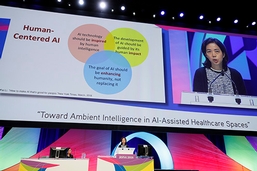Artificial intelligence (AI) has a far more important role to play in health care than replacing experts, according to Fei-Fei Li, PhD. AI will instead assist and enhance the work of clinicians.
During her Thursday lecture, Dr. Li, professor in the Stanford University Computer Science Department and co-director of the upcoming Stanford Human-Centered AI Institute, discussed her research into endowing health care spaces with ambient intelligence. By infusing AI into the physical space of a health care delivery system, she said, we then can find opportunities to improve.

Li
"People are physical bodies being cared for in highly complex, physical spaces in a 24/7 environment," Dr. Li said. "Using ambient intelligence can allow health care to become safer and offer higher quality care and delivery for the patient while optimizing workflow for the physician."
Dr. Li's team is working toward a truly ambient intelligence in health care environments by investigating a variety of ways in which AI can learn and ultimately enhance workflows. She described three key "ingredients" to their work: sensing, recognizing activities and integrating clinical data into the ecosystem.
She described the use of depth sensors, a technology that detects activity while preserving privacy. By placing sensors throughout a physical space, data can be collected about activity over time and space. For example, her team has employed sensors to monitor hand washing activity, creating a remarkably accurate record of hygiene compliance in a hospital. In another project, the team is looking at the variability of activities that take place in an ICU. "I don't have to convince you how important it is to improve care and control costs in the ICU," she said.
"Somehow AI needs to be able to recognize the densely and simultaneously occurring activities and behaviors that occur in a health care space and that are within our range as humans," Dr. Li said. "This is complex because the ways that humans move through space can be recognized differently by computers."

Eventually, Dr. Li believes that AI can get to place where it can detect and reason the type of actions taking place and identify the activity that should take place next. For example, in senior care, Dr. Li noted the importance of patient mobility and understanding how a patient is moving or, in the case of a fall, not moving.
Dr. Li also discussed how to integrate all this data into the broader clinical ecosystem. "All this collected data needs to be integrated into an ecosystem that makes it available so that humans can understand the decision-making processes taking place in a health care setting to ultimately benefit the delivery of health care," Dr. Li said.
In the future, she sees ambient intelligence being infused into whole hospitals where sensors are monitoring every activity and where AI will move beyond recognition to forecasting health care activities in order to improve efficiency and accuracy.
The future of AI is in collaboration with humans, and clinicians working together with AI agents will ultimately enhance the humanity of health care, she said.
"The heart of health care is humans caring for one another," Dr. Li concluded. "We are working to enhance the interaction between patients and clinicians and let clinicians focus on providing care."

